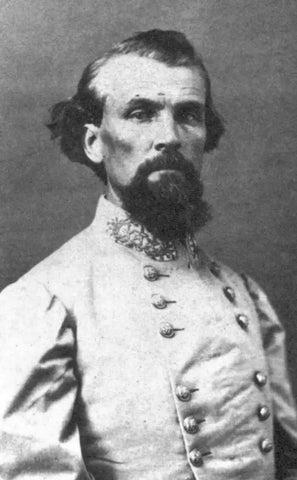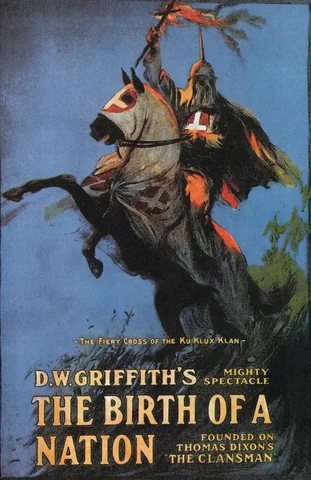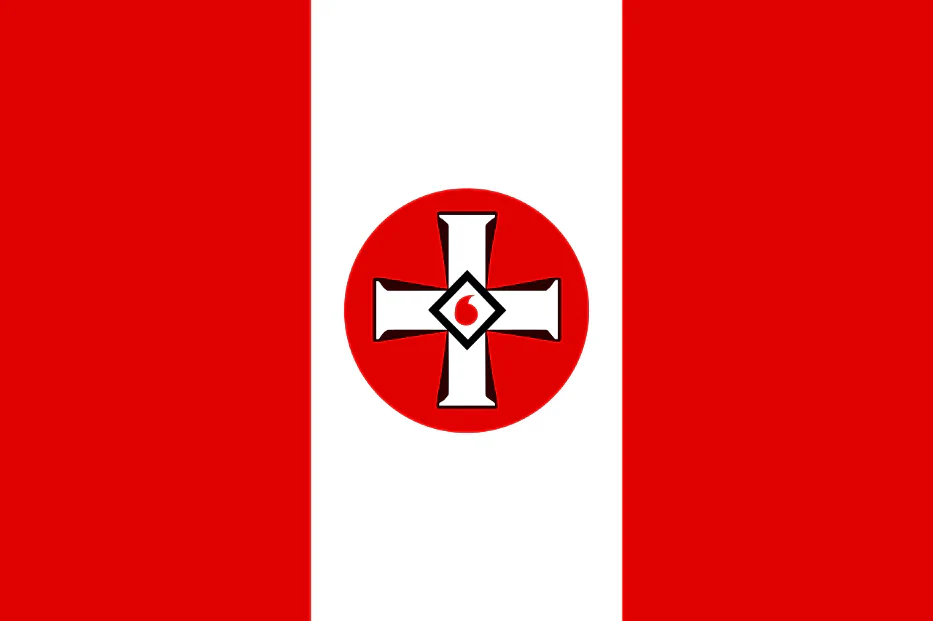One of the most contentious points in American history is the rise of the Ku Klux Klan. Today, many people associate the Klan with a distant memory or a movement from a bygone era. There’s a tendency to diminish the impact of the Klan on American society, perhaps in an attempt to forget its influence. However, the Klan was a force of social and cultural change that profoundly impacted American culture and continues to exert influence today because the organization is as Christian as it is American.
With the election of President Trump, the sense of the KKK fading into obscurity, revealed as an erroneous belief, when white supremacists. Christian Nationalists, and the Proud Boys, among other groups, suddenly emerged with political power. The KKK is often discussed in terms of being a terrorist group but the truth is that the KKK has an unknown number of supporters who are too fearful to openly voice their hate. Trump gave a voice to these bigots and allowed them to stand alongside other mainstream Republicans. The Klan is very much a Christian lay group as well as a terrorist organization. Mainstream Christians argue that the KKK does not represent Christianity but this is not true because the majority of Christians vote exactly the same, supporting the same racist President in 2016 and other sycophants since that time.
The KKK's Beginnings
The Ku Klux Klan (KKK) was first established in the 1860s as a reaction to Reconstruction and the Freedman’s Bureau. The KKK targeted newly freed African Americans and white sympathizers in an effort to disrupt reconstruction efforts. The goal of restoring white supremacy has remained consistent for the KKK since its inception.
 Nathan Bedford Forrest First Grand Wizard of the KKK, By Unidentified photographer — Public Domain
Nathan Bedford Forrest First Grand Wizard of the KKK, By Unidentified photographer — Public Domain
The Ku Klux Klan (KKK) was established in Pulaski, Tennessee, in 1865. Formed by veterans of the Confederate Army, these ex-soldiers named the group after the Greek word ‘kuklos’, which means ‘circle’. The full name translates to ‘Circle of Brothers’. This circle, or Klan, was primarily formed in response to Reconstruction.
The Reconstruction policies implemented after the Civil War created a new social order in the South and throughout the United States. Newly freed African Americans were no longer legally considered subjects to whites, which created turmoil as Southern whites perceived this as a form of reverse slavery. As part of the Reconstruction policies, ex-Confederates had to reaffirm their allegiance to the Union to be eligible to vote. As a result of this lenient policy, Southern Whites quickly began enacting laws that would limit black freedom.
However, Republicans insisted on Reconstruction taking place in a very different manner. The basic idea of Reconstruction at this point began to transform into a far more complex and challenging task of social equality. This transformation concentrated government efforts on policing civil rights and political unrest.
This new ideology of Reconstruction was advanced through military actions, treating the South more like conquered provinces rather than reunified states. In the same way that the original Democratic Reconstruction policies were perhaps too lenient, Republican policies might have been too forceful. As a result of radical reconstruction, violence against African Americans increased as the KKK rose to prominence and terrorized African Americans for many years. The policies that were designed to temper and create social order through acceptance of equality backfired.
The Southern perspective became one of Northern tyranny, and this view was only exacerbated by Reconstruction efforts. From the Southern viewpoint, the federal government had no right to interfere with states’ ideas of equal rights.
The Rise of the KKK
The Ku Klux Klan (KKK) gained an incredible following during this time and cemented itself in Southern American society. Much of the support came from bitterness over government policies intended to aid African Americans, which seemingly ignored poor white Southerners. For instance, sharecropping was enforced by freedmen and the Freedmen’s Bureau. This system allowed workers to negotiate and gave individuals greater autonomy with work. However, Southern whites viewed these situations negatively as sharecropping led to widespread poverty among planters. Sharecroppers, both black and white, were economically confined to almost serf-like conditions of poverty. To work the land, sharecroppers had to buy seed and implements, sometimes from the plantation owner who often charged exorbitant prices against the sharecropper’s next season’s earnings. Arrangements also typically gave half or less of the crop to the sharecropper, with the sale price in some cases set by the landowner.
The viewpoint of the Klan after the Civil War was tainted by poverty and shattered economics. As radical reconstruction was instituted, the white South viewed these new policies as causal forces to the poverty being suffered. Former Confederate Brigadier General George Gordon developed the Klan dogma or Prescript. The Prescript became the fundamental representation of Klan belief in white supremacy. The Prescript states many ideologies such as “white man’s government” and the belief that “…the reenfranchisement and emancipation of the white men of the South, and the restitution of the Southern people to all their rights…” should be their goal. The enfranchisement of blacks was one of the key issues of reconstruction. How could blacks be given the right to vote while poor white Southerners were barred from voting because of reconstruction? This question was answered by the Ku Klux Klan using terrorist tactics against black voters.
Members of the Ku Klux Klan (KKK) donned white suits and conical hats to conceal their identities and often led raiding parties at night. After the war, the KKK was considered a terrorist organization, responsible for the deaths of thousands of African Americans in the South.
- During the Reconstruction era from 1865 to 1876, a report by the Equal Justice Initiative (EJI) documents nearly 2,000 racial terror lynchings of black men, women, and children.
- In 2015, EJI researchers released a report documenting more than 4,400 lynchings that took place between 1877 and 1950.
- The new study brings the overall death toll between 1865 and 1950 to nearly 6,500.
Many Southerners supported the Klan, believing that it was aiding their cause. An example of this can be seen shortly after the ending of the war:
In 1866, a quarrel between whites and black ex-soldiers erupted into a full-fledged riot in Memphis, Tennessee. White policemen assisted the mobs in their violent rampage through the black sections of town. By the time the violence ended, 46 people were dead, 70 more were wounded, and numerous churches and schools had been burned.
President Grant had to enact martial law to halt the killing of African Americans. The KKK, with the consent of many Southerners, was attempting to control or eliminate African Americans. For this reason, I consider this point in history an act of genocide.
From 1865 to 1871, the KKK killed thousands of African Americans and Republicans in the South. They burned homes and kidnapped black leaders in an effort to halt the reconstruction efforts aimed at changing the social order. The problem was so severe that even Southern leaders appealed to the federal government for assistance in maintaining control of their states. The passage of the Civil Rights Act of 1871 allowed President Grant to intervene in the South, enact martial law where necessary, and hunt down Klan members. This action effectively suppressed Klan activity.
The Second Rising of the Klan
The Klan would rise again in the South in 1915 in response to several events such as court cases, yellow journalism, and most notably, a movie glorifying the Klan.
 By Unknown author — Chronicle of the Cinema. (London: Dorling Kindersley), p. 111., Public Domain
By Unknown author — Chronicle of the Cinema. (London: Dorling Kindersley), p. 111., Public Domain
Most historians believe that the resurgence of the Klan was caused by large numbers of immigrants. Since it is a white supremacist, self-proclaimed Christian organization, the Klan has only one group to which it appeals – white Christians. Many white American Christians supported the Klan, viewing immigration as a threat to jobs and morality. During the 1920s, the KKK grew to a membership of four million and became a political force in the United States. Culturally, many white Christians viewed the Klan as a force for good, trying to save America. At the same time, it was also viewed by many as an aberration. Nevertheless, the Klan gained substantial support from the South and from middle-class and poor whites in the North.
On local levels, the Klan carried on its campaign of terror with cross burnings and lynchings in the South. However, the Klan also presented itself as a social and political group in a superficial manner. The Klan would ultimately fragment due to IRS intervention when the organization was forced to disband in 1944 due to tax liens. This did not stop the Klan, but it made it even more difficult to monitor and investigate because the KKK would now exist in many different groups scattered across the South.
Although today’s Klan is much smaller than it was in the early part of the 20th century, it still carries on a campaign of terror but is less concerned with burning crosses and lynching (although these acts still occur). The KKK concerns itself with collecting guns, explosives, committing crimes, and recruiting members.
The Klan’s ideology is based on the belief that nonwhite minorities pose a threat to white Americans, and that a Jewish plot is behind these threats. The Klan presents itself as a solution for white Americans to defend themselves, correct these injustices, and retaliate against their foes. The Klan’s core belief is that violence is necessary to safeguard white America.
Today’s Klan is even more fundamentalist, still identifying itself as a Christian organization and professing a mix of religious rhetoric with racial hatred and prejudice. From the 1990s until the present, the Klan has been responsible for murder and bank robberies. The groups collect and make explosives and have attempted to destroy several public buildings and in one case, a natural gas refinery. Despite appearing to lack public support, the Klan is still alive and carrying on its campaigns of terror because there are still plenty of Christian bigots to support them.































































































